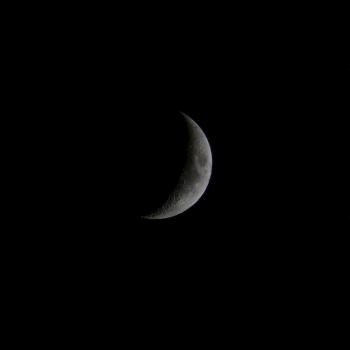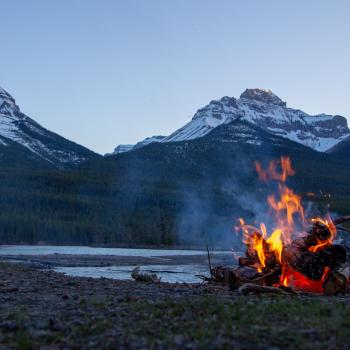For this series, we will be focusing on the path of laity and what it means to be a lay-person in the Otherfaith. This is the most accessible path and the one we should all start from when beginning to interact with the gods and spirits of this faith.
The three most important parts of the Otherfaith are establishing right relationship, prayer, and maintaining a shrine. When we begin our work, we start with the first two (right relationship and prayer) and only bring in shrines and material offerings after we have established those. You may have noticed that I haven’t included lists of offerings or any altar layouts, and this is because we have to begin with our actions and behavior first.
Prayer – Introductory
I’ve written about prayer before, in a broader polytheistic context, here, here, and here. This post will serve as an overview of why we pray in the Otherfaith, as well as how and when.
In the Otherfaith, our prayer is structured. There is, of course, room for spontaneous prayer, but it is important in our devotional practice to build consistent, daily prayer. We open our day with prayer, saying one prayer when we wake, and we end our day with prayer, saying one when we go to sleep. (Not I didn’t say morning and night – people’s schedules might be that they wake in the middle of the night!) There is also structure to the words we say.
This is to build solidarity and community, however distant we may be. We say the same prayers as another, worshiping the same gods, pursuing the same values and path. Not only do we build consistency in our own practice, we connect with others who also devote themselves to the Four Gods.
We pray in order to express our devotion to the gods. When we are beginning, though, this is more often expressing our interest in them. We’re sussing out our relationship with these new deities. Our prayers are a conversation, in a way, with the gods. We use structure in order to help us have that conversation, and because the structure helps us give devotion even when we don’t have words. Repetition is preferred, in order to build connection in our minds to the gods with the words we say, and so that in times of stress we can still call to our gods and give devotion to them just as we lean on them for support.
Frankly, prayer is one of the ways we show we care. Prayer is part of right relationship. We communicate and give devotion to the Four Gods and their spirits, again and again. Daily action in accordance with the gods’ influences is shaping us to be the sort of people whom the gods would want to be friendly with. Prayer is a way of saying hello and talking. For this reason, spontaneous prayer is encouraged, as is ‘simply’ speaking to the gods.
However – when we are preparing to just begin speaking to the gods plainly, we still need to call their names. When I am frustrated with relationships and the issues of love, I’ll still call the Dierne’s name and epithets before speaking. When I want to tell the Clarene how much I appreciate her in my life, I first say her name and related, fitting titles before speaking. The gods can be anywhere but are not everywhere, and certainly not everywhere all the time. They are immanent deities, and they can be embodied, but they aren’t immediately with us at all times. Communication is vital.
Through our consistent prayers, we show our devotion. Through our right action in our daily life, we show our devotion. Through contemplation and never being content, always questions, we show our devotion.
While we do have complex and long prayers in the Otherfaith (the adorations are an example), we tend toward shorter prayers. The Other People aim to blend their religion into their daily life, to make sacred our lives. We do this by living honorably and also through prayer. We convey when we are performing a devotional act. Short and sweet is preferred. These are easier to memorize, easier to repeat, and blend easier into our daily lives. We definitely need the longer prayers and devotions, but especially when we’re beginning we should focus on building consistency. We wake – we pray. We get ready for bed – we pray.
How we pray is pretty much completely up to the individual until we bring in shrines (which will be discussed much later on). We can pray as we’re driving to work, or we can pray kneeling down with prayer beads helping us count off if we’ve decided to repeat a certain prayer, or we can pray in bed right as we open or close our eyes. What is important is that we speak the prayers, even just in a whisper.
What’s important is that we do it.
That isn’t to say that if we forget to pray that all is lost or some horrid calamity will strike us down. Rather, we just pray to the gods when we can and apologize for forgetting or explain what happened. These gods aren’t terribly petty when it comes to devotions, but ideally praying to them should become as easy as breathing. It should be something we do because it is a part of our lives, a part of who we are and what we do, every day.
Before we begin daily devotions, we need to introduce ourselves to the Four Gods. This prayer expresses our interest in engaging with these gods and asks them to reciprocate, and it should be said when we begin pursuing a devotional relationship with these deities.
LAETHA OPHELIA CLARENE DIERNE –I call to the Four Gods of Western Faery. You who burn, you who bury, you who dance, you who drown.
Hear me as I sing to you. I offer my hand to you.
CLARENE, I offer my hand.
OPHELIA, I offer my hand.
LAETHA, I offer my hand.
DIERNE, I offer my hand. West wind, carry my prayer to the gods dwelling there, that they may hear my voice and know me.
To conclude, prayer is our way of communicating with the Four Gods. It is part of living in right relationship with them and allows us to convey our devotion to them. Prayer is:
- Vocalized, signed, or written down & burned (outwardly conveyed)
- An introductory prayer is made when we begin our relationship with the Four Gods
- A daily prayer is said twice daily – at waking and resting
- Consistency is vital
Relevant Links
Prayer: How and Whom
Prayer: Is and Isn’t
Prayer: Why and When
Prayers (Otherfaith Blog)
Prayers Tag (Otherfaith Tumblr)
Basics: Daily Action
Basics: Contemplation
Four Gods of the Otherfaith
the Clarene
the Ophelia
the Laetha
the Dierne












